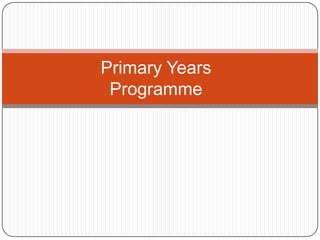
Primary Years Programme IB
- 2. International Baccalaureate General Regulations
- 3. Scope The International Baccalaureate Organization is a foundation that has developed and offers three programmes of international education: “Primary Years Programme” (PYP) the “Middle Years Programme” (MYP) “Diploma Programme”
- 4. An “IB World School” • school, that has been authorized by the IB Organization to offer one or more of its programmes.
- 5. The purposes of the PYP scope and sequence documents are to: provide a tool to inform the whole school community about teaching and learning in each subject area make transparent the essential elements of the PYP in the context of the subject areas clarify the role of the subject areas in a transdisciplinary programme
- 6. What it means to be an IB World School
- 7. The importance of the learner is in the centre of educational process The schools curriculum includes all student activities The outward and forward thinking school
- 8. Application Process Consideration phase Candidate phase Authorization phase
- 9. Does the Role of the Pedagogical Leadership Team Change over Time? Time-consuming Dread, inertia, fatigue, cynicism, of insight, enthusiasm need to be managed To meet all the requirements of the programme
- 11. Role and Responsibilities of Schools
- 12. Role and Responsibilities of Schools Conform to the Rules for IB World Schools: PYP Follow the Education Programme aimed at Ss in the 3-12 age group. Schools are self-sustained for quality of teaching of the PYP. Schools should inform the trustees of the PYP and how the school realizes it. The IB organization does not guarantee that a school will remain capable to implement the PYP.
- 13. The transdisciplinary nature of the programme six transdisciplinary themes. Who we are Where we are in place and time How we express ourselves How the world works How we organize
- 14. International-mindedness in the PYP opportunities: to learn about world issues to get involved in activities that encourage responsible citizenship
- 15. How do we choose to communicate information about assessment? Assessment without feedback is merely judgment Feedback is the component of assessment that lets us interpret the judgment and improve our work.
- 16. Assessment as feedback The teacher needs to consider: if the nature of students’ inquiry develops over nature if students are becoming aware that real problems require solutions based on the integration of knowledge that spans and connects many subject areas if students are demonstrating mastery of skills and an accumulation of a comprehensive knowledge base to enable them to conduct their inquiries successfully, find solutions and solve problems if students are demonstrating both
- 17. The construction of knowledge Children should get an opportunity to: test and revise their models make connections between their previous and current perceptions construct their own meaning
- 18. Inquiry as a pedagogical approach exploring, wondering and questioning experimenting and playing with possibilities making connections between previous learning and current learning making predictions and acting purposefully to see what happens collecting data and reporting findings clarifying existing ideas and reappraising perceptions of events deepening understanding through the application of a concept making and testing theories researching and seeking information
- 19. The Process Inquiry Action
- 21. Models of shared pedagogical leadership Compulsory components of all pedagogical leadership models Programme Coordinator School principal
- 22. Matrix model of pedagogical leadership Head of school School principal Programme coordinator Classroom teachers Single-subject teachers
- 23. Responsibilities of the pedagogical leadership team The school should: identify and train teachers to take on responsibilities for pedagogical leadership develop, in collaboration with specific interest groups, a clear, long-term strategic plan, with actions and a timeline for its implementation develop and implement the school language policy develop and implement the school assessment policy.
- 24. To support the students,the school should: ensure that the curriculum promotes students making connections, thinking conceptually and critically, and reflecting on their own learning ensure support is available for students with diagnosed special needs ensure the balance between transdisciplinary and disciplinary learning ensure that the knowledge component of the school curriculum is worth knowing
- 25. PYP (Primary Years Programme) A Curriculum Framework for International Primary Education, created by International Baccalaureate
- 26. What are the beliefs and values that drive the PYP? IB learner profile
- 27. What is curriculum? all students should be supported to participate in the programme to the fullest extent possible the school’s curriculum includes all those student activities, academic and non- academic, for which the school takes responsibility, since they all have an impact on student learning
- 28. Curriculum What do we want to learn? The written curriculum the identification of a framework of what’s worth knowing How best will we learn? The taught curriculum the theory and application of good classroom practice How will we know what we have The assessed curriculum learned? the theory and application of effective assessment
- 29. What do we want to learn? Essential elements of the written curriculum Knowledge Concepts Skills Attitudes Action
- 30. How best will we learn? Inquiry Planning (list of learning objectives) ICT (information and communication technologies)
- 31. How will we know what we have learned? Assessment ! feedback on the learning process
- 32. Points for consideration if the nature of students’ inquiry develops over time—if they are asking questions of more depth if students are becoming aware that real problems require solutions based on the integration of knowledge that spans and connects many areas if students are demonstrating mastery of skills if students are accumulating a comprehensive knowledge base and can apply their understanding to further their inquiries successfully if students are demonstrating both independence and an ability to work collaboratively
- 33. Subject areas Language Mathematics Science Social Studies Personal, social and physical education Arts
